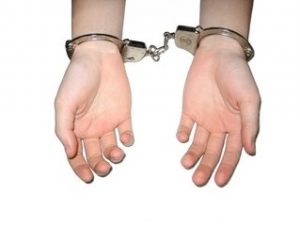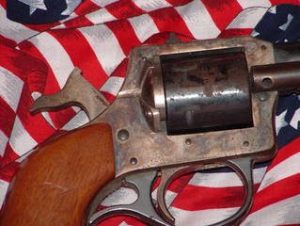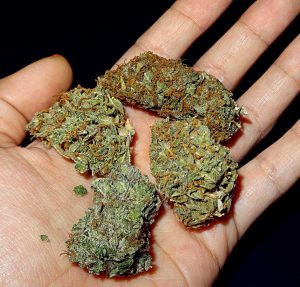 I frequently meet clients who are expecting to be arrested in the near future. This past weekend, I met with a client who was questioned by their employer about some money that was missing. The client admitted to me that they had stolen some checks that have been written to their employer. The client informed me that their employer told them that they had notified the police and the client came to my office asking what they should do when they are arrested. This is a pretty common scenario in my practice. I frequently meet with clients who know that they are in trouble and that the day is coming that they will be arrested and be charged with a crime. Here’s what I told this client, and other clients, who want to know what will happen.
I frequently meet clients who are expecting to be arrested in the near future. This past weekend, I met with a client who was questioned by their employer about some money that was missing. The client admitted to me that they had stolen some checks that have been written to their employer. The client informed me that their employer told them that they had notified the police and the client came to my office asking what they should do when they are arrested. This is a pretty common scenario in my practice. I frequently meet with clients who know that they are in trouble and that the day is coming that they will be arrested and be charged with a crime. Here’s what I told this client, and other clients, who want to know what will happen.
It is important to know that you are under no legal obligation to cooperate with the police when they want to question you about a potential crime that you may have committed. The Fifth Amendment to the United States Constitution gives you the right to not incriminate yourself. This means that you have the right to remain silent and not answer any questions that the police ask you about any crime that you may have committed. Probably the most common mistake that clients make when the police arrest them or question them about a possible crime is that clients think that they can talk themselves out of getting arrested and being charged with a crime. If you did nothing, then I suppose it makes sense to talk to the police. But if you know that you did something wrong and committed a crime, there is no logical explanation for talking to the police. If you know that you committed a crime and you are talking to the police, you will either tell them the truth, or you will lie to them. In either case, talking to the police when you know that you are guilty of a crime is not a smart move. Even if you believe you did nothing wrong, talking to the police and answering their questions is probably not a smart move either. You have no idea what information the police have. They may have incorrect information and by answering their questions, you may be giving their incorrect information more credibility than it deserves. The point of this paragraph is to advise you that if the police start asking you questions about a possible crime, you should immediately demand that they get you a lawyer.
Another common misunderstanding is that the police have to “read you your rights” once you are arrested. The only time the police have to “read you your rights” is when you are being questioned by the police and are you in the custody of the police and are not free to leave. A common example of this scenario is when you are placed under arrest and are taken down to the police station and the police put you in an interrogation room and start questioning you about a crime. In order for the police to be able to use any statements you make in that custodial interrogation, the police have to “read you your rights.” This means that the police have to inform you that you have the right to remain silent and that anything you say can and will be used against you in a Court of law. They also have to advise you that you have the right to a lawyer and that if you cannot afford a lawyer, one will be provided for you for free. Once you make a knowing and intelligent waiver of those rights, the police can question you and any statements you make during the course of the questioning can be used against you in Court. But there is no requirement that the police have to read you your rights once you are arrested.
 Chicago Criminal Lawyer Blog
Chicago Criminal Lawyer Blog











 The title to this article comes from one of the most common questions I get asked by clients who call me to discuss their case. When I ask them what their question is, I’m frequently asked whether the client should have a lawyer for their case.
The title to this article comes from one of the most common questions I get asked by clients who call me to discuss their case. When I ask them what their question is, I’m frequently asked whether the client should have a lawyer for their case. The Grand Jury plays a very important role in our criminal justice system. Few people understand what a Grand Jury is and why it plays such an important role in our criminal justice system. A big reason for this is that the entire process is clouded in such secrecy. Clients are surprised and scared to hear that their case is going to a Grand Jury or that they have been indicted by a Grand Jury. The term “Grand Jury” can be scary for a criminal defendant who doesn’t understand what a Grand Jury is. Let’s talk about what a Grand Jury is and what role the Grand Jury plays in our criminal justice system.
The Grand Jury plays a very important role in our criminal justice system. Few people understand what a Grand Jury is and why it plays such an important role in our criminal justice system. A big reason for this is that the entire process is clouded in such secrecy. Clients are surprised and scared to hear that their case is going to a Grand Jury or that they have been indicted by a Grand Jury. The term “Grand Jury” can be scary for a criminal defendant who doesn’t understand what a Grand Jury is. Let’s talk about what a Grand Jury is and what role the Grand Jury plays in our criminal justice system. The right to a jury trial is one of the fundamental constitutional principles that applies to all criminal cases. If you are accused of a crime that carries a punishment of incarceration for more than 6 months, you have a constitutional right to a trial by a jury. The Illinois Constitution also guarantees you the right to a jury trial in a criminal case. Let’s talk a little bit about what a jury trial is and what happens in a typical jury trial in Illinois.
The right to a jury trial is one of the fundamental constitutional principles that applies to all criminal cases. If you are accused of a crime that carries a punishment of incarceration for more than 6 months, you have a constitutional right to a trial by a jury. The Illinois Constitution also guarantees you the right to a jury trial in a criminal case. Let’s talk a little bit about what a jury trial is and what happens in a typical jury trial in Illinois. Every New Year brings us new laws and new regulations that impact the criminal law and the way we live. On January 1, 2019, several changes to the Illinois gun laws went into effect which make it a little more difficult for people to buy a gun and makes it easier for law enforcement personnel to take guns away from people that may be deemed dangerous. The final change is an attempt to stem the rising tide of mass shootings. The changes to the Illinois gun laws are set forth below.
Every New Year brings us new laws and new regulations that impact the criminal law and the way we live. On January 1, 2019, several changes to the Illinois gun laws went into effect which make it a little more difficult for people to buy a gun and makes it easier for law enforcement personnel to take guns away from people that may be deemed dangerous. The final change is an attempt to stem the rising tide of mass shootings. The changes to the Illinois gun laws are set forth below. In general, there are limits to the amount of time that state prosecutors have to bring criminal charges before they are barred by the Statute of Limitations from filing any criminal charges. If the state files criminal charges beyond the time limit, or the Statute of Limitations, the person charged with the crime can appear in court and get the criminal charges dismissed.
In general, there are limits to the amount of time that state prosecutors have to bring criminal charges before they are barred by the Statute of Limitations from filing any criminal charges. If the state files criminal charges beyond the time limit, or the Statute of Limitations, the person charged with the crime can appear in court and get the criminal charges dismissed. If you are charged with a felony criminal offense in Illinois, you need to know what you are being charged with and what class felony that criminal charge is classified as. Generally, felonies in Illinois are categorized into one of the four classes of felonies in Illinois. Depending on which class your felony is classified as being, the potential penalty will will vary depend on what class felony your crime falls into. Murder is not considered to be part of the four classes of felonies in Illinois. Murder is considered its own special class.
If you are charged with a felony criminal offense in Illinois, you need to know what you are being charged with and what class felony that criminal charge is classified as. Generally, felonies in Illinois are categorized into one of the four classes of felonies in Illinois. Depending on which class your felony is classified as being, the potential penalty will will vary depend on what class felony your crime falls into. Murder is not considered to be part of the four classes of felonies in Illinois. Murder is considered its own special class. If you are charged with a Misdemeanor crime in Illinois, you need to understand what a Misdemeanor is and what the implications could be for your future. A Felony criminal charge is much more severe than a Misdemeanor criminal charge. But that doesn’t mean that a Misdemeanor is not a big deal. While whether you are charged with a Misdemeanor or a Felony may make all the difference in the world you need to understand what a Misdemeanor is and what you are looking at when you go to Court.
If you are charged with a Misdemeanor crime in Illinois, you need to understand what a Misdemeanor is and what the implications could be for your future. A Felony criminal charge is much more severe than a Misdemeanor criminal charge. But that doesn’t mean that a Misdemeanor is not a big deal. While whether you are charged with a Misdemeanor or a Felony may make all the difference in the world you need to understand what a Misdemeanor is and what you are looking at when you go to Court. I frequently receive phone calls from clients who are facing their second DUI. Many times, they do not understand how serious their case is and what they are facing. If you have been arrested and are charged with a DUI, and it’s your second DUI, you need to understand how serious this case could be and what the long-term implications to you could be. Not only could it cost you lots of money, but you could be labeled a convicted criminal for the rest of your life, end up in jail, sentenced to Probation, and lose your license for a very long time. Let me explain to you what makes a second DUI so serious.
I frequently receive phone calls from clients who are facing their second DUI. Many times, they do not understand how serious their case is and what they are facing. If you have been arrested and are charged with a DUI, and it’s your second DUI, you need to understand how serious this case could be and what the long-term implications to you could be. Not only could it cost you lots of money, but you could be labeled a convicted criminal for the rest of your life, end up in jail, sentenced to Probation, and lose your license for a very long time. Let me explain to you what makes a second DUI so serious. In recent years, laws regarding the Possession and Use of Marijuana have been changing throughout the country. This is true in the State of Illinois. In 1931, The Illinois Legislature made the recreational use of marijuana illegal. This legislation was part of a national trend which made the use of marijuana illegal nationally. In recent years, a new national trend has swept throughout the country which is having the opposite effect on the use of Marijuana. This trend clearly appears to be more accepting of the medical and recreational use of Marijuana. This national trend has swept into Illinois as well. In 2016, the Illinois Legislature decriminalized the possession of small amounts of Marijuana in Illinois. If you are caught with 10 grams or less of Marijuana, you will no longer be placed under arrest and subject to criminal prosecution and criminal penalties. In 2016 the State of Illinois made the possession of 10 grams or less of Marijuana a Municipal Ordinance Violation which only carries a civil penalty. The City of Chicago decriminalized the possession of small amounts of Marijuana in 2012.
In recent years, laws regarding the Possession and Use of Marijuana have been changing throughout the country. This is true in the State of Illinois. In 1931, The Illinois Legislature made the recreational use of marijuana illegal. This legislation was part of a national trend which made the use of marijuana illegal nationally. In recent years, a new national trend has swept throughout the country which is having the opposite effect on the use of Marijuana. This trend clearly appears to be more accepting of the medical and recreational use of Marijuana. This national trend has swept into Illinois as well. In 2016, the Illinois Legislature decriminalized the possession of small amounts of Marijuana in Illinois. If you are caught with 10 grams or less of Marijuana, you will no longer be placed under arrest and subject to criminal prosecution and criminal penalties. In 2016 the State of Illinois made the possession of 10 grams or less of Marijuana a Municipal Ordinance Violation which only carries a civil penalty. The City of Chicago decriminalized the possession of small amounts of Marijuana in 2012.